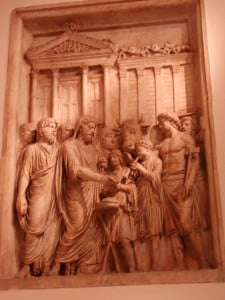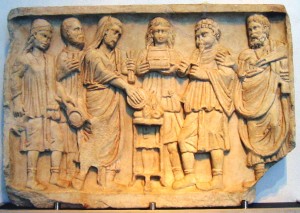
The Second Postumnian Law states: “Sacrifices are not to be celebrated with an effusion of blood, but consist of flour, wine, and the least costly offerings.”
On this point the Numa Tradition is clear; it prohibits the use of immolations (L. pl. immolationes), and most specifically in the cultus for Vesta, Fides, Carmentis, Jupiter Elicitor, and Terminus. Immolationes are also prohibited in the worship of Feronia, for the Bona Dea and in rituals for several other Gods and Goddesses too numerous to list here. The different flamines are prohibited from participating in certain immolationes and Augurs, too, are prohibited from performing all immolationes out of a concern for purification laws. In keeping with the Numa Tradition, the sacerdotes of the cultores Deorum Romanorum refrain from participating in blood sacrifices. We recognize that immolations were once used in the Religio Romana, introduced as foreign rituals, but are not part of the earliest and purest form of our tradition. Instead we keep to the instruction from Numa to offer oblations (L. pl. oblationes) of wine or milk, bread and flour, flowers and incense. We use the advice, too, to use “the least costly offerings” in sharing what we have with the Gods, making worship more reverent and personal in the same way it had been in the time of Numa Pompilius.
“Formerly what served to conciliate Gods and men was spelt and pure salt’s glistening grain. . . . Altars smoked contented with Sabine juniper and the burning laurel crackled loudly. A man was wealthy if he could add violets to crowns fashioned from meadow flowers; the knife which eviscerates a pole-axed bull had no role in the sacred rites (Ovid, Fasti 1.337-348).”
Traditions concerning the oblations of Romulus and Numa and the immolations first introduced for Ceres (Ovid, Fas. 1.349; Met. 15.111-13) lead us to more fundamental questions about sacrifices in the Religio Romana. Sallustius, a fourth century philosopher, gave three reasons for which sacrifices are offered.
First, one gives thanks to the Gods for all They provide. We give back a portion of what we receive.
Second is when we pray to the Gods. “Prayers offered without sacrifices are only words, with sacrifices they are live words; the wording gives meaning to the life while the life animates the words.” Prayer in the Religio Romana implies much more than silently expressing desires. Gesture and sacrifice of the body conjoin with the words and thoughts of our mind, together with sincere intent and devotion of the soul. Body, mind and soul brought together within ourselves are then joined with the God or Goddess who receives our prayers and sacrifices.
“The Gods,” said Varro, “do not desire blood sacrifice; Their statues want it even less.”
Thirdly, Sallustius says, “The happiness of every object is its own perfection, and perfection for each is communion with its own cause.” Everything proceeds from the Gods and shall return to the Gods in its own time. Or as Proclus stated, “Every effect remains in its cause, proceeds from it, and reverts upon it (Elements of Theology, Prop. 35).” Having lived its life, performed its purpose in life, each constituent part of an object shall return to its source, its being perfected in the completion of its entire cycle of life. This is true with humans, animals, and plants, and even, it may be said, for inanimate objects as well. Part of an offering may be consumed in the altar fire and its ashes returned into Nature. But its true being is divine, released at the time of sacrifice, and must be duly returned into the divine from which it derives.

In the first reason given above, the perspective was from that of the deities, returning what is already under Their providence. The second reason has the view of the worshiper in mind as he seeks to conjoin his entire being with the divine. For the third reason Sallustius looks at sacrifice from the perspective of what is being offered, returning it to its divine source alone. Reverting back to its origin, returning through each stage of its procession from the source, and thus returning towards the divine, a sacrifice reverts upon its own perfection in the Divine (Proclus, EoT, Prop. 37). Each reason relates back to what I wrote earlier concerning the numina of the Gods in objects and on how our offerings are carried along in a flow of the divine. Sacrifice is a means of fueling this flow of the divine, working alongside with the Gods to maintain a natural order, preserving balance and harmony in our world.
Salustius also poses six types of sacrifices that may be performed in the Religio Romana. 1) First is to honor the Gods and to commemorate certain events such as the dedication of a temple. 2) To propitiate the Gods when some disaster has occurred. 3) Similarly, if divination, dreams or visions reveal a requirement of sacrifice. 4) Often a sacrifice is performed by an individual in thanks, after a vow has been met by the Gods. A vow (nuncupatio) is first made that a sacrifice will be offered, or that some action such as the dedication of an altar, will be performed to fulfill the vow, on condition that the God or Goddess performs some request. One is obligated to offer thanks if the request is fulfilled. Sometimes, 5) in expectation that prayers will be answered, a sacrifice is made, but there is no obligation on the part of the deity. Most often this last type of sacrifice would be dedicated pro salute in hopes of being healed of some illness. 6) Lastly there are those sacrifices performed as part of a purification ritual. Ritual purity is a central concern of the Religio Romana just as it is in Judaism. Sacrifices offered to the Lares accompany every purification ritual, asking for both their aid and their approval in our undertaking. As a preliminary to any of the other times we would perform sacrifices, those conducted in purification rituals are thus the most common.
Roman ritual is complex, repetitive, and difficult to perform properly. There are rules on what are appropriate to offer, and what are inappropriate, what gestures to use for certain rites, what types of prayers to use alongside sacrifice, but even this has a purpose related back to Numa. He handed down complex rituals so that worshipers could not perform them haphazardly or thoughtlessly, and thus he encourages reverence and sincerity in worship. Even in what at first seems a clear prohibition there is complex of thought and purpose behind the act of Roman sacrifice in the Numa Tradition.















